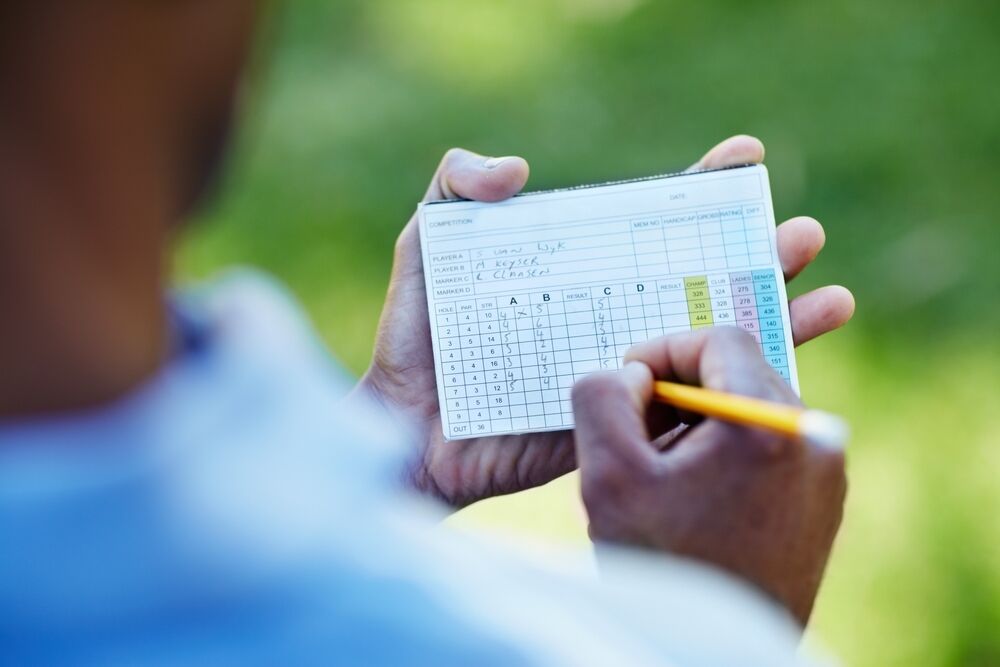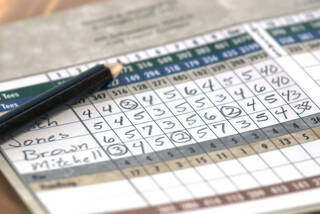Here's the Average Golf Score & Average Golf Handicaps
Thanks to the National Golf Foundation and USGA, we know the average golf scores and handicaps

So, you want to know the average golf score and the average golf handicap. The good news is there’s a straightforward answer to both.
The quick and dirty average golf scores and handicaps are:
- The average golf score is 94
- The average handicap of male golfers is 14.0
- The average handicap of female golfers is 28.0
Of course, there are caveats to these figures that we have to dive into.
Average Golf Score
The National Golf Foundation published an enlightening report in August 2024 that puts the average golf score at 94.
However, more than half of the golfers who completed the survey admitted to bending the rules in one way or another, whether it’s not counting penalty strokes or taking breakfast balls and mulligans. Tack on generous gimmies and preferred lies year-round – practices we’ve all seen countless times – and it’s easy to see how this “average” skews to the vanity side.
What’s more, 23% of players reported that they don’t keep score, and the NGF figures that 6 million golfers out of the 26 million who play fall into that category.
It’s not a stretch to assume that the average score of those 6 million players – if they kept a true card – would be higher than the average score of the players who do keep score, I’d bet drastically so.

Bogey Golfer Official Handicap and Stats
Average Golf Handicap
According to the USGA, the average handicap for male golfers in the United States is 14.0, while the average handicap of female golfers is 28.0.
Handicap averages are significantly less convoluted than the average golf score, simply because the USGA oversees all golf handicaps in the United States, and publishes its average statistics annually.
If you’re wondering why the average handicap isn’t closer to 22 – considering an average score of 94 on a par-72 course is 22-over par – there are two huge reasons those numbers are so far apart.
- A golf handicap is not intended to be a representation of an average score, in fact the system is designed so players shoot above their course handicap roughly 80% of the time
- In 2023, only 3.2 million golfers kept an official handicap out of 26 million golfers, and it’s likely that the players who keep a handicap skew more heavily toward the better players
People often assume that a golf handicap is a glorified formula to pinpoint an average score, but that’s not the case. Your golf handicap is an average of the best eight scoring differentials (the number you get after you run your score through the slope and rating calculations) out of your last 20. That means that only 40% of your scores even count towards your handicap.
Naturally, of those eight, roughly half will be above the average, and you’re left with about only four out of 20 rounds, 20%, coming in lower than your handicap.
That alone doesn’t explain the entire gap between average scores and average handicaps. Similar to the assumption we made earlier about the golfers who don’t keep score, it’s safe to assume that of the 88 or so percent of players who don’t keep an official handicap, their averages scores skew higher than the players who do keep an official handicap, which also helps explain why the average handicap represents better scores than the average scores.

Golf Handicaps 101 & How to Know if Yours is Good
Benchmarks for Your Game
Comparing how your game stacks up against these averages is a great benchmark to evaluate your progress. If you don’t keep a handicap with the USGA, but your game is coming along, getting an official handicap is a great way to gauge your progress, and having a handicap makes it easy to compete in net competitions, and compete against your buddies on a level playing field.